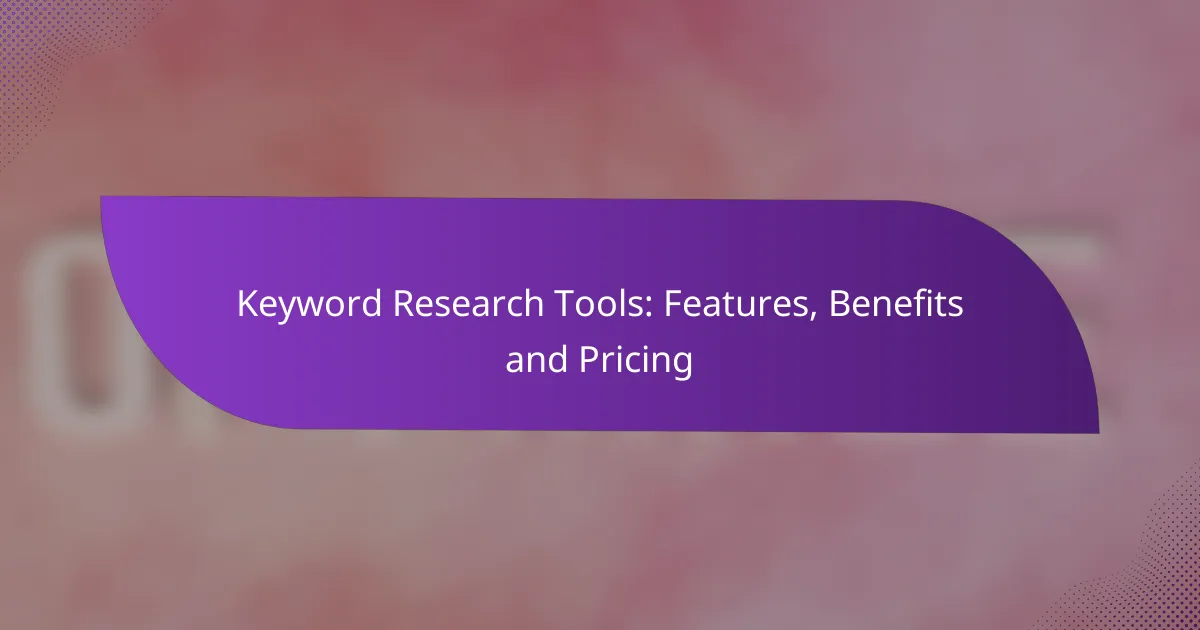Keyword research tools are essential for optimizing SEO strategies by helping users identify relevant keywords, analyze competition, and enhance content visibility. With a variety of features and pricing options available, these tools cater to diverse needs, providing valuable insights into search volume and trends. By leveraging these tools, marketers can make informed decisions that drive traffic and improve their overall content strategy.

What are the best keyword research tools for SEO?
The best keyword research tools for SEO help identify relevant keywords, analyze competition, and optimize content for search engines. These tools vary in features, pricing, and usability, catering to different needs and budgets.
SEMrush
SEMrush is a comprehensive SEO tool that offers extensive keyword research capabilities, including keyword volume, difficulty, and trends. It allows users to analyze competitors’ keyword strategies and provides insights into organic and paid search performance.
Consider using SEMrush for its robust analytics and user-friendly interface. It is particularly beneficial for businesses looking to enhance their online visibility through targeted keyword strategies.
Ahrefs
Ahrefs is known for its powerful backlink analysis and keyword research features. It provides detailed keyword metrics, such as search volume, clicks, and keyword difficulty, making it easier to identify profitable keywords.
Ahrefs is ideal for users who prioritize link-building alongside keyword research. Its extensive database and accurate data make it a preferred choice for many SEO professionals.
Google Keyword Planner
Google Keyword Planner is a free tool that helps users discover new keywords and see estimates of the searches they receive. It is particularly useful for advertisers looking to optimize their Google Ads campaigns.
While it may lack some advanced features found in paid tools, it is a great starting point for beginners. Users should consider linking it with their Google Ads account for enhanced insights.
Moz Keyword Explorer
Moz Keyword Explorer offers a user-friendly interface and provides keyword suggestions, search volume, and difficulty scores. It also features a unique metric called “Priority,” which helps prioritize keywords based on potential impact.
This tool is suitable for those who want a straightforward approach to keyword research. Moz’s community and educational resources can also help users improve their SEO knowledge.
Ubersuggest
Ubersuggest is a budget-friendly keyword research tool that provides keyword suggestions, search volume, and competition analysis. It is particularly useful for small businesses and freelancers looking for cost-effective solutions.
Users should take advantage of Ubersuggest’s features like content ideas and backlink data. However, be aware that its database may not be as extensive as some premium tools.

How do keyword research tools improve SEO?
Keyword research tools enhance SEO by helping users discover relevant keywords that can drive traffic to their websites. These tools provide insights into search volume, competition, and trends, enabling marketers to make informed decisions about their content strategy.
Identify high-traffic keywords
High-traffic keywords are terms that attract a significant number of searches. By using keyword research tools, you can identify these keywords based on search volume data, which often ranges from hundreds to thousands of searches per month. Focus on long-tail keywords, as they typically have less competition and can lead to higher conversion rates.
When selecting keywords, consider the intent behind them. For instance, keywords like “buy running shoes” indicate a strong purchase intent, while “best running shoes” may attract users in the research phase. Prioritize keywords that align with your content goals.
Analyze competitor strategies
Competitor analysis is crucial for understanding the landscape of your niche. Keyword research tools allow you to see which keywords competitors rank for and their estimated traffic. This information can help you identify gaps in your own strategy and uncover opportunities for targeting less competitive keywords.
Look for patterns in your competitors’ content and keyword usage. Tools often provide insights into their top-performing pages, which can inform your content creation and optimization efforts. Aim to differentiate your content by offering unique value or perspectives.
Optimize content for search engines
Once you have identified relevant keywords, optimizing your content is essential for improving search engine rankings. Incorporate target keywords naturally into your titles, headings, and body text, ensuring that the content remains engaging and informative. Avoid keyword stuffing, as this can lead to penalties from search engines.
Regularly update your content to reflect changing trends and search behaviors. Use analytics to track performance and adjust your strategy based on what works. A/B testing different headlines or meta descriptions can also help improve click-through rates.

What features should I look for in a keyword research tool?
When selecting a keyword research tool, prioritize features that enhance your ability to discover relevant keywords, analyze competition, and understand user intent. Essential functionalities include keyword suggestions, search volume data, and competitive analysis capabilities.
Keyword suggestions and volume
A robust keyword research tool should provide a diverse array of keyword suggestions along with their search volume metrics. Look for tools that generate long-tail keywords, as these often have lower competition and higher conversion rates.
Consider tools that offer volume data in your target market’s language and currency. For example, if you are targeting the European market, ensure the tool provides search volume in relevant units like monthly searches in EUR.
Competitive analysis tools
Effective keyword research tools include competitive analysis features that allow you to evaluate your competitors’ keyword strategies. This can help identify gaps in your own strategy and opportunities for improvement.
Look for functionalities that provide insights into competitors’ rankings, traffic estimates, and backlink profiles. Tools that visualize this data can make it easier to understand how you stack up against your competition.
Search intent categorization
Understanding search intent is crucial for effective keyword targeting. A good keyword research tool should categorize keywords based on user intent, such as informational, navigational, or transactional.
By focusing on keywords that align with your content goals and user needs, you can improve your chances of ranking higher in search results. Choose a tool that clearly indicates the intent behind each keyword to guide your content creation effectively.

What is the pricing structure for popular keyword research tools?
The pricing structure for popular keyword research tools varies significantly based on features, subscription plans, and user needs. Most tools offer tiered pricing that allows users to select a plan that fits their budget and requirements, typically ranging from monthly to annual subscriptions.
SEMrush pricing plans
SEMrush offers several pricing plans, including Pro, Guru, and Business tiers. The Pro plan starts at around $119.95 per month, suitable for freelancers and startups, while the Guru plan, priced at approximately $229.95 monthly, is ideal for small to medium-sized businesses. The Business plan, costing about $449.95 per month, caters to larger organizations with advanced needs.
Each plan includes features like keyword tracking, site audits, and competitive analysis, but the higher tiers provide additional benefits such as increased limits on projects and reports. Users should evaluate their specific requirements to choose the most cost-effective option.
Ahrefs subscription options
Ahrefs provides four subscription options: Lite, Standard, Advanced, and Agency. The Lite plan starts at around $99 per month, which is suitable for individuals or small teams, while the Standard plan, at about $179 monthly, is better for growing businesses. The Advanced plan is priced at approximately $399, and the Agency plan costs around $999 per month, designed for large agencies with extensive client needs.
Each plan varies in features such as the number of tracked keywords and the amount of data available. Users should consider their keyword research volume and the depth of analysis required when selecting a plan.
Moz pricing tiers
Moz offers three main pricing tiers: Standard, Medium, and Large. The Standard plan is priced at approximately $99 per month, making it accessible for small businesses, while the Medium plan costs around $179 monthly, suitable for growing teams. The Large plan, at about $299 per month, is designed for larger enterprises with comprehensive SEO needs.
Each tier includes access to Moz’s keyword explorer, site audits, and rank tracking tools, but higher tiers unlock additional features and increased limits on usage. It’s advisable to assess the specific tools and data requirements before committing to a subscription.

How do I choose the right keyword research tool for my needs?
To choose the right keyword research tool, consider your specific requirements, including budget, features, and usability. Evaluate how each tool aligns with your goals, such as SEO optimization or content marketing, to ensure it meets your needs effectively.
Assessing budget and features
Start by determining your budget for a keyword research tool, as prices can vary significantly. Basic tools may cost around $20 to $50 per month, while advanced options can range from $100 to several hundred dollars monthly, depending on features.
Next, identify the essential features you require, such as keyword suggestions, search volume data, competition analysis, and integration with other platforms. Prioritize tools that offer a balance between cost and the functionalities that matter most to your strategy.
Trial versions and demos
Many keyword research tools offer trial versions or demos, allowing you to test their capabilities before committing. Take advantage of these trials to explore the user interface and assess how well the tool meets your needs.
During the trial, focus on key functionalities like ease of use, accuracy of data, and the quality of insights provided. This hands-on experience can help you make an informed decision and avoid investing in a tool that doesn’t align with your requirements.

What are the benefits of using keyword research tools?
Keyword research tools provide valuable insights that help businesses and content creators identify relevant keywords to target, improving search engine visibility. By understanding search trends and user intent, these tools enhance content effectiveness and drive organic traffic.
Enhanced content strategy
Using keyword research tools allows you to develop a more focused content strategy by identifying topics that resonate with your target audience. By analyzing search volume and competition, you can prioritize content that is more likely to attract visitors and engage them effectively.
For instance, if a keyword has a high search volume but low competition, it may be a prime target for your next blog post or article. This strategic approach not only saves time but also maximizes the impact of your content efforts.
To enhance your content strategy, regularly update your keyword list based on trends and seasonal changes. Tools like Google Keyword Planner or SEMrush can help you track shifts in user behavior and adapt your content accordingly.
